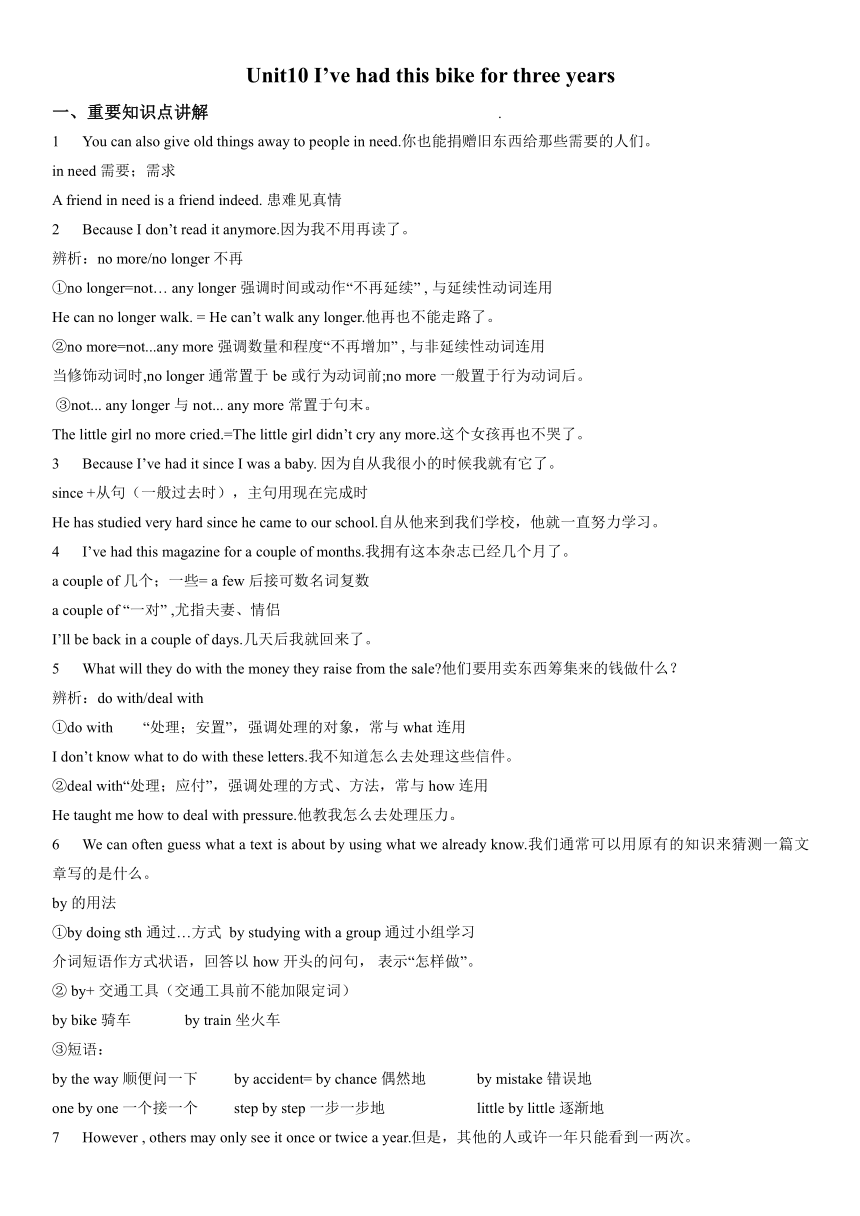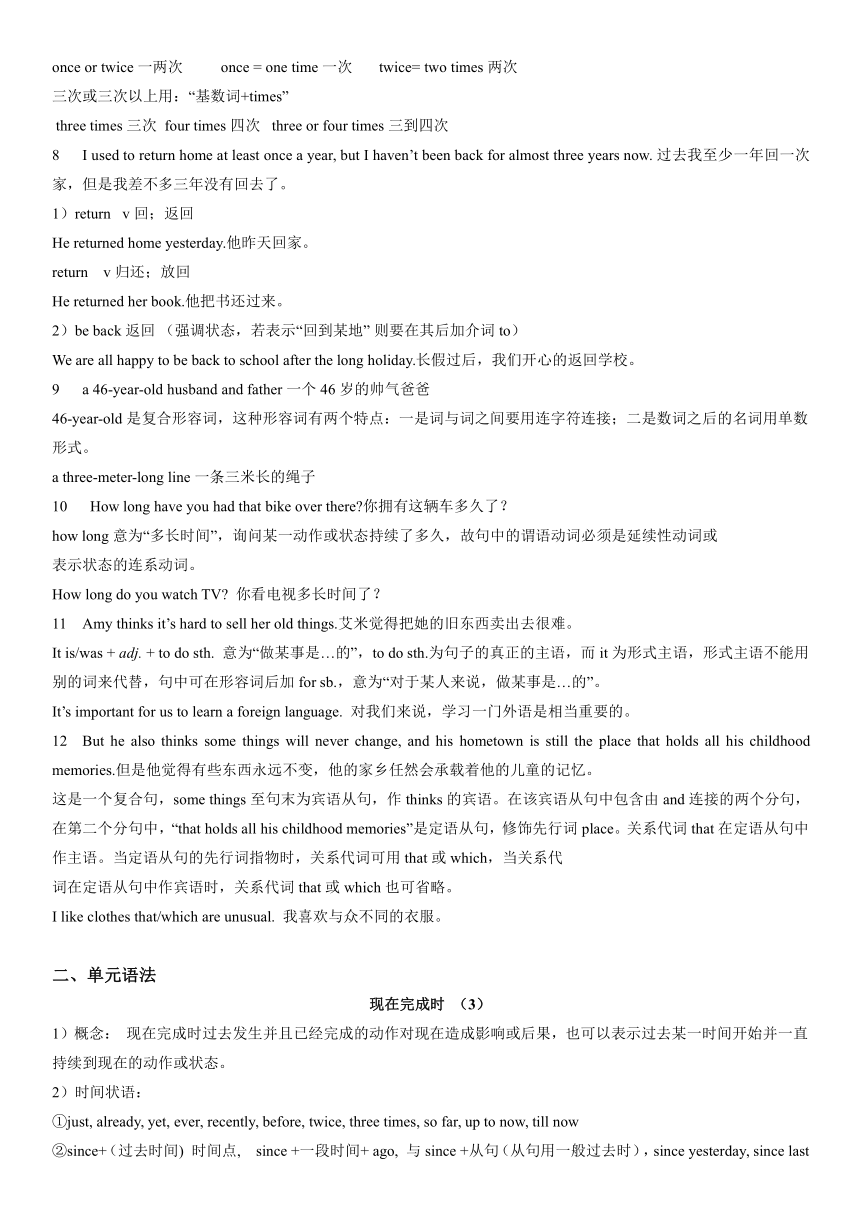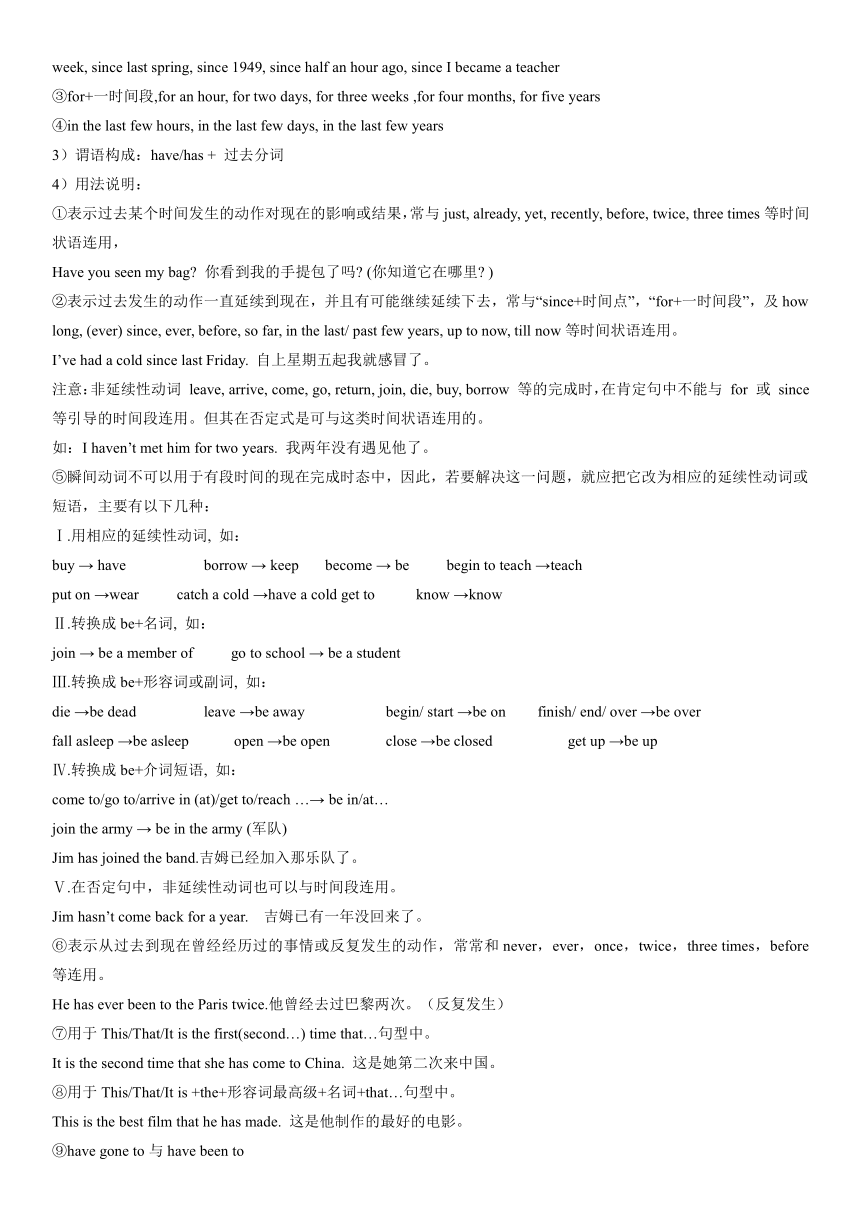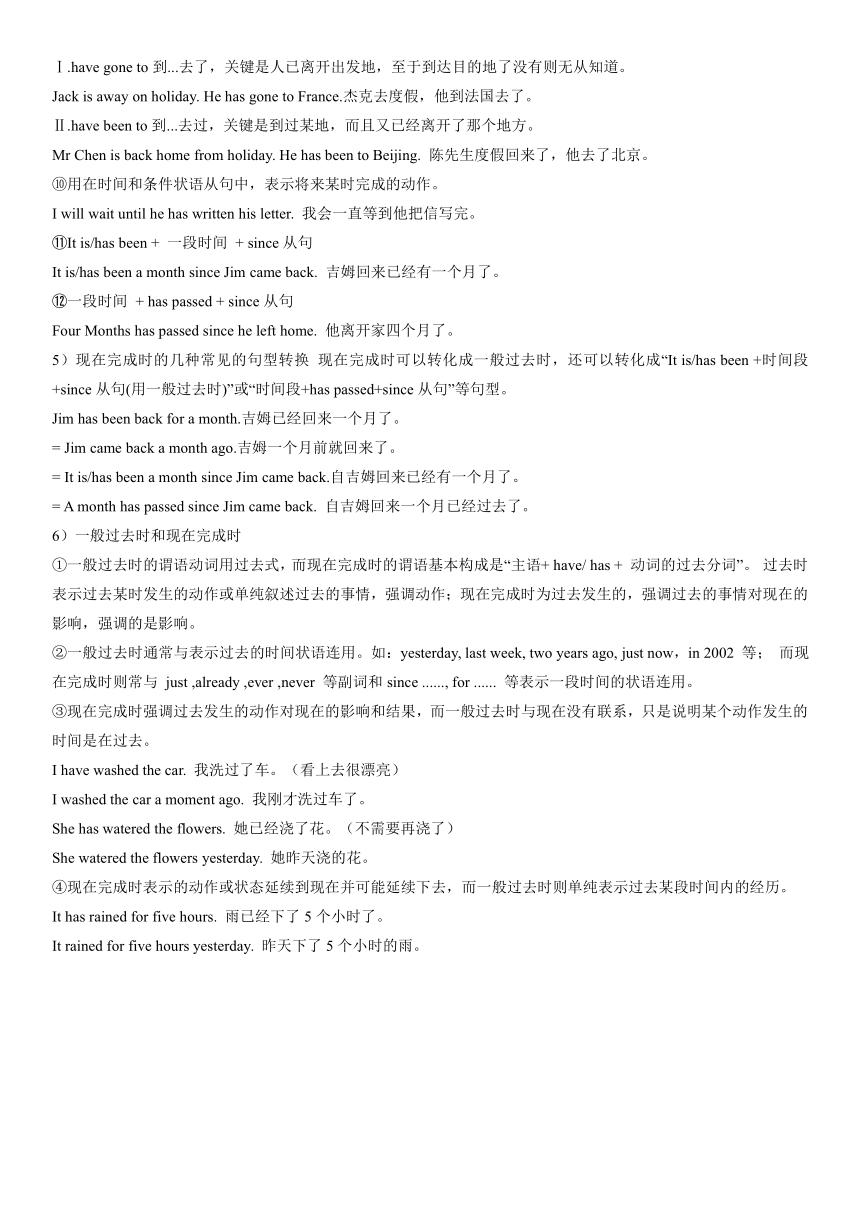Unit 10 I've had this bike for three years.单元学案(含答案) 2023-2024学年人教版英语八年级下册
文档属性
| 名称 | Unit 10 I've had this bike for three years.单元学案(含答案) 2023-2024学年人教版英语八年级下册 |  | |
| 格式 | docx | ||
| 文件大小 | 33.2KB | ||
| 资源类型 | 教案 | ||
| 版本资源 | 人教新目标(Go for it)版 | ||
| 科目 | 英语 | ||
| 更新时间 | 2024-05-09 10:15:58 | ||
图片预览




文档简介
Unit10 I’ve had this bike for three years
一、重要知识点讲解 .?
1 You can also give old things away to people in need.你也能捐赠旧东西给那些需要的人们。
in need 需要;需求
A friend in need is a friend indeed. 患难见真情
2 Because I don’t read it anymore.因为我不用再读了。
辨析:no more/no longer不再
①no longer=not… any longer强调时间或动作“不再延续” , 与延续性动词连用
He can no longer walk. = He can’t walk any longer.他再也不能走路了。
②no more=not...any more强调数量和程度“不再增加” , 与非延续性动词连用
当修饰动词时,no longer通常置于be或行为动词前;no more一般置于行为动词后。
③not... any longer与not... any more常置于句末。
The little girl no more cried.=The little girl didn’t cry any more.这个女孩再也不哭了。
3 Because I’ve had it since I was a baby. 因为自从我很小的时候我就有它了。
since +从句(一般过去时),主句用现在完成时
He has studied very hard since he came to our school.自从他来到我们学校,他就一直努力学习。
4 I’ve had this magazine for a couple of months.我拥有这本杂志已经几个月了。
a couple of 几个;一些= a few 后接可数名词复数
a couple of “一对” ,尤指夫妻、情侣
I’ll be back in a couple of days.几天后我就回来了。
5 What will they do with the money they raise from the sale 他们要用卖东西筹集来的钱做什么?
辨析:do with/deal with
①do with “处理;安置”,强调处理的对象,常与what连用
I don’t know what to do with these letters.我不知道怎么去处理这些信件。
②deal with“处理;应付”,强调处理的方式、方法,常与how连用
He taught me how to deal with pressure.他教我怎么去处理压力。
6 We can often guess what a text is about by using what we already know.我们通常可以用原有的知识来猜测一篇文章写的是什么。
by的用法
①by doing sth 通过…方式 by studying with a group通过小组学习
介词短语作方式状语,回答以how开头的问句, 表示“怎样做”。
② by+ 交通工具(交通工具前不能加限定词)
by bike骑车 by train坐火车
③短语:
by the way 顺便问一下 by accident= by chance 偶然地 by mistake 错误地
one by one 一个接一个 step by step 一步一步地 little by little 逐渐地
7 However , others may only see it once or twice a year.但是,其他的人或许一年只能看到一两次。
once or twice 一两次 once = one time一次 twice= two times 两次
三次或三次以上用:“基数词+times”
three times 三次 four times 四次 three or four times 三到四次
8 I used to return home at least once a year, but I haven’t been back for almost three years now. 过去我至少一年回一次家,但是我差不多三年没有回去了。
1)return v 回;返回
He returned home yesterday.他昨天回家。
return v 归还;放回
He returned her book.他把书还过来。
2)be back 返回 (强调状态,若表示“回到某地” 则要在其后加介词to)
We are all happy to be back to school after the long holiday.长假过后,我们开心的返回学校。
9 a 46-year-old husband and father一个46岁的帅气爸爸
46-year-old是复合形容词,这种形容词有两个特点:一是词与词之间要用连字符连接;二是数词之后的名词用单数形式。
a three-meter-long line一条三米长的绳子
10 How long have you had that bike over there 你拥有这辆车多久了?
how long意为“多长时间”,询问某一动作或状态持续了多久,故句中的谓语动词必须是延续性动词或
表示状态的连系动词。
How long do you watch TV 你看电视多长时间了?
11 Amy thinks it’s hard to sell her old things.艾米觉得把她的旧东西卖出去很难。
It is/was + adj. + to do sth. 意为“做某事是…的”,to do sth.为句子的真正的主语,而it为形式主语,形式主语不能用别的词来代替,句中可在形容词后加for sb.,意为“对于某人来说,做某事是…的”。
It’s important for us to learn a foreign language. 对我们来说,学习一门外语是相当重要的。
12 But he also thinks some things will never change, and his hometown is still the place that holds all his childhood memories.但是他觉得有些东西永远不变,他的家乡任然会承载着他的儿童的记忆。
这是一个复合句,some things至句末为宾语从句,作thinks的宾语。在该宾语从句中包含由and连接的两个分句,在第二个分句中,“that holds all his childhood memories”是定语从句,修饰先行词place。关系代词that在定语从句中作主语。当定语从句的先行词指物时,关系代词可用that或which,当关系代
词在定语从句中作宾语时,关系代词that或which也可省略。
I like clothes that/which are unusual. 我喜欢与众不同的衣服。
二、单元语法
现在完成时 (3)
1)概念: 现在完成时过去发生并且已经完成的动作对现在造成影响或后果,也可以表示过去某一时间开始并一直持续到现在的动作或状态。
2)时间状语:
①just, already, yet, ever, recently, before, twice, three times, so far, up to now, till now
②since+(过去时间) 时间点, since +一段时间+ ago, 与since +从句(从句用一般过去时),since yesterday, since last week, since last spring, since 1949, since half an hour ago, since I became a teacher
③for+一时间段,for an hour, for two days, for three weeks ,for four months, for five years
④in the last few hours, in the last few days, in the last few years
3)谓语构成:have/has + 过去分词
4)用法说明:
①表示过去某个时间发生的动作对现在的影响或结果,常与just, already, yet, recently, before, twice, three times等时间状语连用,
Have you seen my bag 你看到我的手提包了吗 (你知道它在哪里 )
②表示过去发生的动作一直延续到现在,并且有可能继续延续下去,常与“since+时间点”,“for+一时间段”,及how long, (ever) since, ever, before, so far, in the last/ past few years, up to now, till now等时间状语连用。
I’ve had a cold since last Friday. 自上星期五起我就感冒了。
注意:非延续性动词 leave, arrive, come, go, return, join, die, buy, borrow 等的完成时,在肯定句中不能与 for 或 since 等引导的时间段连用。但其在否定式是可与这类时间状语连用的。
如:I haven’t met him for two years. 我两年没有遇见他了。
⑤瞬间动词不可以用于有段时间的现在完成时态中,因此,若要解决这一问题,就应把它改为相应的延续性动词或短语,主要有以下几种:
Ⅰ.用相应的延续性动词, 如:
buy → have borrow → keep become → be begin to teach →teach
put on →wear catch a cold →have a cold get to know →know
Ⅱ.转换成be+名词, 如:
join → be a member of go to school → be a student
Ⅲ.转换成be+形容词或副词, 如:
die →be dead leave →be away begin/ start →be on finish/ end/ over →be over
fall asleep →be asleep open →be open close →be closed get up →be up
Ⅳ.转换成be+介词短语, 如:
come to/go to/arrive in (at)/get to/reach …→ be in/at…
join the army → be in the army (军队)
Jim has joined the band.吉姆已经加入那乐队了。
Ⅴ.在否定句中,非延续性动词也可以与时间段连用。
Jim hasn’t come back for a year. 吉姆已有一年没回来了。
⑥表示从过去到现在曾经经历过的事情或反复发生的动作,常常和never,ever,once,twice,three times,before等连用。
He has ever been to the Paris twice.他曾经去过巴黎两次。(反复发生)
⑦用于This/That/It is the first(second…) time that…句型中。
It is the second time that she has come to China. 这是她第二次来中国。
⑧用于This/That/It is +the+形容词最高级+名词+that…句型中。
This is the best film that he has made. 这是他制作的最好的电影。
⑨have gone to与have been to
Ⅰ.have gone to到...去了,关键是人已离开出发地,至于到达目的地了没有则无从知道。
Jack is away on holiday. He has gone to France.杰克去度假,他到法国去了。
Ⅱ.have been to到...去过,关键是到过某地,而且又已经离开了那个地方。
Mr Chen is back home from holiday. He has been to Beijing. 陈先生度假回来了,他去了北京。
⑩用在时间和条件状语从句中,表示将来某时完成的动作。
I will wait until he has written his letter. 我会一直等到他把信写完。
It is/has been + 一段时间 + since从句
It is/has been a month since Jim came back. 吉姆回来已经有一个月了。
一段时间 + has passed + since从句
Four Months has passed since he left home. 他离开家四个月了。
5)现在完成时的几种常见的句型转换 现在完成时可以转化成一般过去时,还可以转化成“It is/has been +时间段+since从句(用一般过去时)”或“时间段+has passed+since从句”等句型。
Jim has been back for a month.吉姆已经回来一个月了。
= Jim came back a month ago.吉姆一个月前就回来了。
= It is/has been a month since Jim came back.自吉姆回来已经有一个月了。
= A month has passed since Jim came back. 自吉姆回来一个月已经过去了。
6)一般过去时和现在完成时
①一般过去时的谓语动词用过去式,而现在完成时的谓语基本构成是“主语+ have/ has + 动词的过去分词”。 过去时表示过去某时发生的动作或单纯叙述过去的事情,强调动作;现在完成时为过去发生的,强调过去的事情对现在的影响,强调的是影响。
②一般过去时通常与表示过去的时间状语连用。如:yesterday, last week, two years ago, just now,in 2002 等; 而现在完成时则常与 just ,already ,ever ,never 等副词和since ......, for ...... 等表示一段时间的状语连用。
③现在完成时强调过去发生的动作对现在的影响和结果,而一般过去时与现在没有联系,只是说明某个动作发生的时间是在过去。
I have washed the car. 我洗过了车。(看上去很漂亮)
I washed the car a moment ago. 我刚才洗过车了。
She has watered the flowers. 她已经浇了花。(不需要再浇了)
She watered the flowers yesterday. 她昨天浇的花。
④现在完成时表示的动作或状态延续到现在并可能延续下去,而一般过去时则单纯表示过去某段时间内的经历。
It has rained for five hours. 雨已经下了5个小时了。
It rained for five hours yesterday. 昨天下了5个小时的雨。
同步练习
Ⅰ.单项选择(15)
1. —Look! Who is ________________ boy in front of the teaching building
—Oh, he’s Ben. He’s ________________ honest boy.
A. a; an B. a; the C. an; the D. the; an
【答案】D
【解析】考查冠词的运用。句意:——看!教学楼前面的那个男孩是谁?——哦,他是本,他是一个诚实的男孩。介词短语in front of the teaching building意为:在教学楼前面,修饰名词boy,作后置定语,属特指,boy前需加定冠词the;根据句意可知,他是一名诚实的男孩,因选用不定冠词表泛指,且honest以元音音素/ /开头,需用不定冠词an。选D。
2. —Mom, may I add some more sugar to the soup
—No way. Too much ______________ food is bad for your teeth.
A. delicious B. healthy C. traditional D. sweet
【答案】D
【解析】考查形容词词义辨析。句意:——妈妈,我可以在汤里加多点糖吗?——不行,太甜的食物对你牙齿不好。delicious美味的;healthy健康的;traditional传统的;sweet甜的。根据句意可知,太多的甜食对牙齿不好。故选D。
3. Mary always does well in her lessons. She works the hardest ______________ all the students.
A. among B. during C. between D. through
【答案】A
【解析】考查介词辨析。句意:玛丽上课总是做得很好。她在所有学生中工作最努力。among意为:在……中,指三者或三者以上之间;during意为:在……期间;between意为:在……之间,指两者之间;through意为:通过。根据all the students(在所有学生中)可知,应是“三者以上的中间”。故选A。
4. —As we know, it’s very difficult to live in a foreign country like the UK, the US and so on.
—I agree. _____________ if you don't understand the local language.
A. Especially B. Generally C. Naturally D. Exactly
【答案】A
【解析】考查副词词义辨析。句意:——众所周知,在英国、美国等国家生活是非常困难的。——我同意。尤其是如果你不了解当地的语言。Especially特别;尤其;Generally通常;普遍地;Naturally自然地;Exactly恰好地。根据语境可知,应选A。
5. The TV show Letters Alive brings back people's _______________ of writing to each other.
A. ideas B. hobbies C. styles D. memories
【答案】D
【解析】考查名词词义辨析。句意:《见字如面》这个电视节目让人们回想起彼此写信的记忆。ideas主意;hobbies爱好;styles风格;memories回忆。根据brings back可知,此处表回忆,故选D。
6. _____________, volunteering is both a chance to help others and a good way to develop ourselves.
A. To my surprise B. To be honest C. At first D. As a result
【答案】B
【解析】考查短语词义辨析。句意:老实说,志愿服务既是一个帮助别人的机会,也是一个发展自己的好方法。to my surprise令我惊讶的是;to be honest老实说;at first首先;as a result结果。根据 volunteering is both a chance to help others and a good way to develop ourselves可知,此处表达对志愿者工作的由衷评价,To be honest符合语境,故选B。
7. Sally ________________ the box for her missing letter, but she didn't find it.
A. searched B. regarded C. offered D. provided
【答案】A
【解析】考查动词词义辨析。句意:莎莉在盒子里寻找她丢失的信,但没有找到。search搜寻;看待;offer提供;provide提供。根据句意可知,应选A。
8. Could you please help _______________ the information about the passengers I’m busy now.
A. bring out B. check out C. work out D. give out
【答案】B
【解析】考查动词短语辨析。句意:你能帮我查一下有关乘客的信息吗?我现在很忙。A. bring out使显现;B. check out 检查,检验;C. work out解决,计算出 ;D. give out分发。结合句意可知,应选B。
9. —How long have you ________________ here
—For two days. I __________________ here the day before yesterday.
A. been; came B. come; come C. came; has come D. been; have come
【答案】A
【解析】考查动词时态辨析。句意:——你来这里多长时间了?——两天了,我前天来的。根据答句For two days可知,问句需使用现在完成时,且how long引导的特殊疑问句中不能出现短暂动词,排除C;根据时间状语the day before yesterday(前天)可知,答句应用一般过去时,排除B、D,选A。
10. The little girl has to spend two hours________________ the violin every day.
A. to practice playing B. practicing playing C. to practice to play D. practice playing
【答案】B
【解析】考查非谓语动词的用法。句意:这个小女孩必须每天练习两小时的小提琴。主语+spend+时间+doing意为:花费时间做某事;practice doing意为:练习干某事。根据句意及动词的用法可知,选B。
11. —________________ is your school
—I can’t remember it well. I________________ for ten years.
A. How big; have left B. What big; have been away
C. How big; have been away D. What big; have left
【答案】C
【解析】考查时态的辨析。句意:你们学校多大?我不记得了。我已经离开十年了。形容面积、大小、多少等常用特殊疑问词how+adj;根据时间状语for ten years可知,需用现在完成时,选C。
12. This is a big library ________________ more than two ________________ books.
A. with; millions B. at; millions C. with; million D. at; million
【答案】C
【解析】考查常见介词辨析及确切数字的表达。句意:这是一个藏书超过200万册的大图书馆。with介词,意为:具有,带有;million意为:百万,前有具体数字时,million不加s;two million意为:两百万。故选择C。
13. Millie hates the movie. She ________________ it as one of the worst movies she’s ever seen.
A. dresses B. uses C. decides D. regards
【答案】D
【解析】考查动词短语的构成。句意:米莉讨厌这部电影。她认为这是她看过的最糟糕的电影之一。dresses意为:装饰/打扮;uses意为:使用;decides意为:决定;regards意为:认为。动词短语regard as意为:把……当作……;根据句意可知,选D。
14. —How many English words ________________ so far, Jenny
—About 5, 000.
A. did you learn B. do you learn C. have you learned D. will you learn
【答案】C
【解析】考查动词时态辨析。句意:——珍妮,为到目前为止,你已经学习了多少单词?——大约5000个。根据时间状语so far可知,应使用现在完成时,故选C。
15. —We are having a party next Sunday, and I'd like you to come.
—___________________! I have a meeting to attend that day.
A. Good luck B. What a shame C. Never do it again D. Well done
【答案】B
【详解】考查交际用语。句意:——下星期天我们要开派对,我想请你来。——真可惜!那天我有个会议要参加。Good luck祝你好运;What a shame真遗憾;Never do it again再也不要这样了;Well done做得好。根据句意可知,此处表示:很遗憾不能参加,需用what a shame,故选B。
Ⅱ. 完形填空(10)
Last Sunday morning, I had a yard sale with my sister. We set up a long table in the (16) ______________ and placed many old things on it. We made a poster (海报) to tell people that we wanted to (17) ______________ some money for a student in our school. The student was ill but her parents didn't have enough money to take her to (18) ______________. Maybe because of our kindness, our sale went very well. We were very happy because the (19) ______________ old things we left, the more money we could (20) ______________ for the student. Just then, a boy came to our sale. He looked at many things and finally (21) ______________ a necklace (项链).
“How much is this ” he asked. “Twenty yuan,” I answered.
He took out some coins from his pocket and (22) ______________. Then he asked us, “Could I have it for 15 yuan This is all I have.”
We wondered why the boy wanted to buy a necklace. So I said, “Why do you want to buy it?”
“Tomorrow is my mother's birthday. I want to give this nice necklace to her as a (23) ______________. At the same time, I can also do (24) ______________ for the student who needs help. I think my mother will be happy about what I do.”
My sister and I were both moved (感动) by him. So we (25) ______________ to let the boy buy it for 15 yuan. After saying thanks to us, he went away with the necklace happily. And we were happy, too.
【文章大意】为了给生病的学生筹钱治病,作者和妹妹制作了海报,在上星期日早晨进行庭院出售,一个小男孩的举动让她们很感动。
16. A. bedroom B. kitchen C. yard D. living room
【答案】C
【解析】句意:我们设了一个长长的桌子在院子里,把许多旧东西放在上面。根据前文Last Sunday morning, I had a yard sale with my sister可知,应是在“院子”里。故选C。
17. A. own B. raise C. check D. wait
【答案】B
【解析】句意:我们做了一张海报告诉人们,我们想为学校的一个学生筹钱。根据句意可知,应是为学生看病“筹钱”。故选B。
18. A. school B. market C. library D. hospital
【答案】D
【解析】句意:这位学生病了,但她的父母没有足够的钱带她去医院。根据句意及生活经验可知,生病了,应带病人去“医院”。故选C。
19. A. less B. fewer C. more D. much
【答案】B
【解析】句意:我们都非常高兴,因为我们剩余的旧东西越少,我们就可以为那个学生筹集更多的钱。things为可数名词复数,不能使用less或much修饰,排除A、D。根据句意可知,剩余的旧物越少(fewer),筹集的钱就越多。故选B。
20. A. waste B. spend C. collect D. cost
【答案】C
【解析】句意:我们都非常高兴,因为我们剩余的旧东西越少,我们可以为学生收集更多的钱。根据语境可知,卖掉旧东西,是为了“筹集”钱,为学生治病。故选C。
21. A. gave up B. blew out C. picked up D. wrote down
【答案】C
【解析】句意:他看了很多东西,最后拿起一条项链。根据句意可知,应是“捡起”项链。故选C。
22. A. counted B. cleared C. searched D. held
【答案】A
【解析】句意:他从口袋里掏出一些硬币,数了数。根据语境可知,男孩“数”硬币。故选A。
23. A. pay B. gift C. prize D. memory
【答案】B
【解析】句意:我想把这条漂亮的项链送给她作为礼物。根据句意可知,“妈妈”过生日,项链是生日“礼物”。故选B。
24. A. anything B. something C. everything D. nothing
【答案】B
【解析】句意:同时,我也能为需要帮助的学生做点什么。根据句意可知,此处表示为学生“做点事”。故选B。
25. A. agreed B. disagreed C. remembered D. forgot
【答案】A
【解析】句意:所以我们同意让男孩用15元买它。根据下文After saying thanks to us, he went away with the necklace happily可知,应是“同意”了男孩的请求。故选A。
一、重要知识点讲解 .?
1 You can also give old things away to people in need.你也能捐赠旧东西给那些需要的人们。
in need 需要;需求
A friend in need is a friend indeed. 患难见真情
2 Because I don’t read it anymore.因为我不用再读了。
辨析:no more/no longer不再
①no longer=not… any longer强调时间或动作“不再延续” , 与延续性动词连用
He can no longer walk. = He can’t walk any longer.他再也不能走路了。
②no more=not...any more强调数量和程度“不再增加” , 与非延续性动词连用
当修饰动词时,no longer通常置于be或行为动词前;no more一般置于行为动词后。
③not... any longer与not... any more常置于句末。
The little girl no more cried.=The little girl didn’t cry any more.这个女孩再也不哭了。
3 Because I’ve had it since I was a baby. 因为自从我很小的时候我就有它了。
since +从句(一般过去时),主句用现在完成时
He has studied very hard since he came to our school.自从他来到我们学校,他就一直努力学习。
4 I’ve had this magazine for a couple of months.我拥有这本杂志已经几个月了。
a couple of 几个;一些= a few 后接可数名词复数
a couple of “一对” ,尤指夫妻、情侣
I’ll be back in a couple of days.几天后我就回来了。
5 What will they do with the money they raise from the sale 他们要用卖东西筹集来的钱做什么?
辨析:do with/deal with
①do with “处理;安置”,强调处理的对象,常与what连用
I don’t know what to do with these letters.我不知道怎么去处理这些信件。
②deal with“处理;应付”,强调处理的方式、方法,常与how连用
He taught me how to deal with pressure.他教我怎么去处理压力。
6 We can often guess what a text is about by using what we already know.我们通常可以用原有的知识来猜测一篇文章写的是什么。
by的用法
①by doing sth 通过…方式 by studying with a group通过小组学习
介词短语作方式状语,回答以how开头的问句, 表示“怎样做”。
② by+ 交通工具(交通工具前不能加限定词)
by bike骑车 by train坐火车
③短语:
by the way 顺便问一下 by accident= by chance 偶然地 by mistake 错误地
one by one 一个接一个 step by step 一步一步地 little by little 逐渐地
7 However , others may only see it once or twice a year.但是,其他的人或许一年只能看到一两次。
once or twice 一两次 once = one time一次 twice= two times 两次
三次或三次以上用:“基数词+times”
three times 三次 four times 四次 three or four times 三到四次
8 I used to return home at least once a year, but I haven’t been back for almost three years now. 过去我至少一年回一次家,但是我差不多三年没有回去了。
1)return v 回;返回
He returned home yesterday.他昨天回家。
return v 归还;放回
He returned her book.他把书还过来。
2)be back 返回 (强调状态,若表示“回到某地” 则要在其后加介词to)
We are all happy to be back to school after the long holiday.长假过后,我们开心的返回学校。
9 a 46-year-old husband and father一个46岁的帅气爸爸
46-year-old是复合形容词,这种形容词有两个特点:一是词与词之间要用连字符连接;二是数词之后的名词用单数形式。
a three-meter-long line一条三米长的绳子
10 How long have you had that bike over there 你拥有这辆车多久了?
how long意为“多长时间”,询问某一动作或状态持续了多久,故句中的谓语动词必须是延续性动词或
表示状态的连系动词。
How long do you watch TV 你看电视多长时间了?
11 Amy thinks it’s hard to sell her old things.艾米觉得把她的旧东西卖出去很难。
It is/was + adj. + to do sth. 意为“做某事是…的”,to do sth.为句子的真正的主语,而it为形式主语,形式主语不能用别的词来代替,句中可在形容词后加for sb.,意为“对于某人来说,做某事是…的”。
It’s important for us to learn a foreign language. 对我们来说,学习一门外语是相当重要的。
12 But he also thinks some things will never change, and his hometown is still the place that holds all his childhood memories.但是他觉得有些东西永远不变,他的家乡任然会承载着他的儿童的记忆。
这是一个复合句,some things至句末为宾语从句,作thinks的宾语。在该宾语从句中包含由and连接的两个分句,在第二个分句中,“that holds all his childhood memories”是定语从句,修饰先行词place。关系代词that在定语从句中作主语。当定语从句的先行词指物时,关系代词可用that或which,当关系代
词在定语从句中作宾语时,关系代词that或which也可省略。
I like clothes that/which are unusual. 我喜欢与众不同的衣服。
二、单元语法
现在完成时 (3)
1)概念: 现在完成时过去发生并且已经完成的动作对现在造成影响或后果,也可以表示过去某一时间开始并一直持续到现在的动作或状态。
2)时间状语:
①just, already, yet, ever, recently, before, twice, three times, so far, up to now, till now
②since+(过去时间) 时间点, since +一段时间+ ago, 与since +从句(从句用一般过去时),since yesterday, since last week, since last spring, since 1949, since half an hour ago, since I became a teacher
③for+一时间段,for an hour, for two days, for three weeks ,for four months, for five years
④in the last few hours, in the last few days, in the last few years
3)谓语构成:have/has + 过去分词
4)用法说明:
①表示过去某个时间发生的动作对现在的影响或结果,常与just, already, yet, recently, before, twice, three times等时间状语连用,
Have you seen my bag 你看到我的手提包了吗 (你知道它在哪里 )
②表示过去发生的动作一直延续到现在,并且有可能继续延续下去,常与“since+时间点”,“for+一时间段”,及how long, (ever) since, ever, before, so far, in the last/ past few years, up to now, till now等时间状语连用。
I’ve had a cold since last Friday. 自上星期五起我就感冒了。
注意:非延续性动词 leave, arrive, come, go, return, join, die, buy, borrow 等的完成时,在肯定句中不能与 for 或 since 等引导的时间段连用。但其在否定式是可与这类时间状语连用的。
如:I haven’t met him for two years. 我两年没有遇见他了。
⑤瞬间动词不可以用于有段时间的现在完成时态中,因此,若要解决这一问题,就应把它改为相应的延续性动词或短语,主要有以下几种:
Ⅰ.用相应的延续性动词, 如:
buy → have borrow → keep become → be begin to teach →teach
put on →wear catch a cold →have a cold get to know →know
Ⅱ.转换成be+名词, 如:
join → be a member of go to school → be a student
Ⅲ.转换成be+形容词或副词, 如:
die →be dead leave →be away begin/ start →be on finish/ end/ over →be over
fall asleep →be asleep open →be open close →be closed get up →be up
Ⅳ.转换成be+介词短语, 如:
come to/go to/arrive in (at)/get to/reach …→ be in/at…
join the army → be in the army (军队)
Jim has joined the band.吉姆已经加入那乐队了。
Ⅴ.在否定句中,非延续性动词也可以与时间段连用。
Jim hasn’t come back for a year. 吉姆已有一年没回来了。
⑥表示从过去到现在曾经经历过的事情或反复发生的动作,常常和never,ever,once,twice,three times,before等连用。
He has ever been to the Paris twice.他曾经去过巴黎两次。(反复发生)
⑦用于This/That/It is the first(second…) time that…句型中。
It is the second time that she has come to China. 这是她第二次来中国。
⑧用于This/That/It is +the+形容词最高级+名词+that…句型中。
This is the best film that he has made. 这是他制作的最好的电影。
⑨have gone to与have been to
Ⅰ.have gone to到...去了,关键是人已离开出发地,至于到达目的地了没有则无从知道。
Jack is away on holiday. He has gone to France.杰克去度假,他到法国去了。
Ⅱ.have been to到...去过,关键是到过某地,而且又已经离开了那个地方。
Mr Chen is back home from holiday. He has been to Beijing. 陈先生度假回来了,他去了北京。
⑩用在时间和条件状语从句中,表示将来某时完成的动作。
I will wait until he has written his letter. 我会一直等到他把信写完。
It is/has been + 一段时间 + since从句
It is/has been a month since Jim came back. 吉姆回来已经有一个月了。
一段时间 + has passed + since从句
Four Months has passed since he left home. 他离开家四个月了。
5)现在完成时的几种常见的句型转换 现在完成时可以转化成一般过去时,还可以转化成“It is/has been +时间段+since从句(用一般过去时)”或“时间段+has passed+since从句”等句型。
Jim has been back for a month.吉姆已经回来一个月了。
= Jim came back a month ago.吉姆一个月前就回来了。
= It is/has been a month since Jim came back.自吉姆回来已经有一个月了。
= A month has passed since Jim came back. 自吉姆回来一个月已经过去了。
6)一般过去时和现在完成时
①一般过去时的谓语动词用过去式,而现在完成时的谓语基本构成是“主语+ have/ has + 动词的过去分词”。 过去时表示过去某时发生的动作或单纯叙述过去的事情,强调动作;现在完成时为过去发生的,强调过去的事情对现在的影响,强调的是影响。
②一般过去时通常与表示过去的时间状语连用。如:yesterday, last week, two years ago, just now,in 2002 等; 而现在完成时则常与 just ,already ,ever ,never 等副词和since ......, for ...... 等表示一段时间的状语连用。
③现在完成时强调过去发生的动作对现在的影响和结果,而一般过去时与现在没有联系,只是说明某个动作发生的时间是在过去。
I have washed the car. 我洗过了车。(看上去很漂亮)
I washed the car a moment ago. 我刚才洗过车了。
She has watered the flowers. 她已经浇了花。(不需要再浇了)
She watered the flowers yesterday. 她昨天浇的花。
④现在完成时表示的动作或状态延续到现在并可能延续下去,而一般过去时则单纯表示过去某段时间内的经历。
It has rained for five hours. 雨已经下了5个小时了。
It rained for five hours yesterday. 昨天下了5个小时的雨。
同步练习
Ⅰ.单项选择(15)
1. —Look! Who is ________________ boy in front of the teaching building
—Oh, he’s Ben. He’s ________________ honest boy.
A. a; an B. a; the C. an; the D. the; an
【答案】D
【解析】考查冠词的运用。句意:——看!教学楼前面的那个男孩是谁?——哦,他是本,他是一个诚实的男孩。介词短语in front of the teaching building意为:在教学楼前面,修饰名词boy,作后置定语,属特指,boy前需加定冠词the;根据句意可知,他是一名诚实的男孩,因选用不定冠词表泛指,且honest以元音音素/ /开头,需用不定冠词an。选D。
2. —Mom, may I add some more sugar to the soup
—No way. Too much ______________ food is bad for your teeth.
A. delicious B. healthy C. traditional D. sweet
【答案】D
【解析】考查形容词词义辨析。句意:——妈妈,我可以在汤里加多点糖吗?——不行,太甜的食物对你牙齿不好。delicious美味的;healthy健康的;traditional传统的;sweet甜的。根据句意可知,太多的甜食对牙齿不好。故选D。
3. Mary always does well in her lessons. She works the hardest ______________ all the students.
A. among B. during C. between D. through
【答案】A
【解析】考查介词辨析。句意:玛丽上课总是做得很好。她在所有学生中工作最努力。among意为:在……中,指三者或三者以上之间;during意为:在……期间;between意为:在……之间,指两者之间;through意为:通过。根据all the students(在所有学生中)可知,应是“三者以上的中间”。故选A。
4. —As we know, it’s very difficult to live in a foreign country like the UK, the US and so on.
—I agree. _____________ if you don't understand the local language.
A. Especially B. Generally C. Naturally D. Exactly
【答案】A
【解析】考查副词词义辨析。句意:——众所周知,在英国、美国等国家生活是非常困难的。——我同意。尤其是如果你不了解当地的语言。Especially特别;尤其;Generally通常;普遍地;Naturally自然地;Exactly恰好地。根据语境可知,应选A。
5. The TV show Letters Alive brings back people's _______________ of writing to each other.
A. ideas B. hobbies C. styles D. memories
【答案】D
【解析】考查名词词义辨析。句意:《见字如面》这个电视节目让人们回想起彼此写信的记忆。ideas主意;hobbies爱好;styles风格;memories回忆。根据brings back可知,此处表回忆,故选D。
6. _____________, volunteering is both a chance to help others and a good way to develop ourselves.
A. To my surprise B. To be honest C. At first D. As a result
【答案】B
【解析】考查短语词义辨析。句意:老实说,志愿服务既是一个帮助别人的机会,也是一个发展自己的好方法。to my surprise令我惊讶的是;to be honest老实说;at first首先;as a result结果。根据 volunteering is both a chance to help others and a good way to develop ourselves可知,此处表达对志愿者工作的由衷评价,To be honest符合语境,故选B。
7. Sally ________________ the box for her missing letter, but she didn't find it.
A. searched B. regarded C. offered D. provided
【答案】A
【解析】考查动词词义辨析。句意:莎莉在盒子里寻找她丢失的信,但没有找到。search搜寻;看待;offer提供;provide提供。根据句意可知,应选A。
8. Could you please help _______________ the information about the passengers I’m busy now.
A. bring out B. check out C. work out D. give out
【答案】B
【解析】考查动词短语辨析。句意:你能帮我查一下有关乘客的信息吗?我现在很忙。A. bring out使显现;B. check out 检查,检验;C. work out解决,计算出 ;D. give out分发。结合句意可知,应选B。
9. —How long have you ________________ here
—For two days. I __________________ here the day before yesterday.
A. been; came B. come; come C. came; has come D. been; have come
【答案】A
【解析】考查动词时态辨析。句意:——你来这里多长时间了?——两天了,我前天来的。根据答句For two days可知,问句需使用现在完成时,且how long引导的特殊疑问句中不能出现短暂动词,排除C;根据时间状语the day before yesterday(前天)可知,答句应用一般过去时,排除B、D,选A。
10. The little girl has to spend two hours________________ the violin every day.
A. to practice playing B. practicing playing C. to practice to play D. practice playing
【答案】B
【解析】考查非谓语动词的用法。句意:这个小女孩必须每天练习两小时的小提琴。主语+spend+时间+doing意为:花费时间做某事;practice doing意为:练习干某事。根据句意及动词的用法可知,选B。
11. —________________ is your school
—I can’t remember it well. I________________ for ten years.
A. How big; have left B. What big; have been away
C. How big; have been away D. What big; have left
【答案】C
【解析】考查时态的辨析。句意:你们学校多大?我不记得了。我已经离开十年了。形容面积、大小、多少等常用特殊疑问词how+adj;根据时间状语for ten years可知,需用现在完成时,选C。
12. This is a big library ________________ more than two ________________ books.
A. with; millions B. at; millions C. with; million D. at; million
【答案】C
【解析】考查常见介词辨析及确切数字的表达。句意:这是一个藏书超过200万册的大图书馆。with介词,意为:具有,带有;million意为:百万,前有具体数字时,million不加s;two million意为:两百万。故选择C。
13. Millie hates the movie. She ________________ it as one of the worst movies she’s ever seen.
A. dresses B. uses C. decides D. regards
【答案】D
【解析】考查动词短语的构成。句意:米莉讨厌这部电影。她认为这是她看过的最糟糕的电影之一。dresses意为:装饰/打扮;uses意为:使用;decides意为:决定;regards意为:认为。动词短语regard as意为:把……当作……;根据句意可知,选D。
14. —How many English words ________________ so far, Jenny
—About 5, 000.
A. did you learn B. do you learn C. have you learned D. will you learn
【答案】C
【解析】考查动词时态辨析。句意:——珍妮,为到目前为止,你已经学习了多少单词?——大约5000个。根据时间状语so far可知,应使用现在完成时,故选C。
15. —We are having a party next Sunday, and I'd like you to come.
—___________________! I have a meeting to attend that day.
A. Good luck B. What a shame C. Never do it again D. Well done
【答案】B
【详解】考查交际用语。句意:——下星期天我们要开派对,我想请你来。——真可惜!那天我有个会议要参加。Good luck祝你好运;What a shame真遗憾;Never do it again再也不要这样了;Well done做得好。根据句意可知,此处表示:很遗憾不能参加,需用what a shame,故选B。
Ⅱ. 完形填空(10)
Last Sunday morning, I had a yard sale with my sister. We set up a long table in the (16) ______________ and placed many old things on it. We made a poster (海报) to tell people that we wanted to (17) ______________ some money for a student in our school. The student was ill but her parents didn't have enough money to take her to (18) ______________. Maybe because of our kindness, our sale went very well. We were very happy because the (19) ______________ old things we left, the more money we could (20) ______________ for the student. Just then, a boy came to our sale. He looked at many things and finally (21) ______________ a necklace (项链).
“How much is this ” he asked. “Twenty yuan,” I answered.
He took out some coins from his pocket and (22) ______________. Then he asked us, “Could I have it for 15 yuan This is all I have.”
We wondered why the boy wanted to buy a necklace. So I said, “Why do you want to buy it?”
“Tomorrow is my mother's birthday. I want to give this nice necklace to her as a (23) ______________. At the same time, I can also do (24) ______________ for the student who needs help. I think my mother will be happy about what I do.”
My sister and I were both moved (感动) by him. So we (25) ______________ to let the boy buy it for 15 yuan. After saying thanks to us, he went away with the necklace happily. And we were happy, too.
【文章大意】为了给生病的学生筹钱治病,作者和妹妹制作了海报,在上星期日早晨进行庭院出售,一个小男孩的举动让她们很感动。
16. A. bedroom B. kitchen C. yard D. living room
【答案】C
【解析】句意:我们设了一个长长的桌子在院子里,把许多旧东西放在上面。根据前文Last Sunday morning, I had a yard sale with my sister可知,应是在“院子”里。故选C。
17. A. own B. raise C. check D. wait
【答案】B
【解析】句意:我们做了一张海报告诉人们,我们想为学校的一个学生筹钱。根据句意可知,应是为学生看病“筹钱”。故选B。
18. A. school B. market C. library D. hospital
【答案】D
【解析】句意:这位学生病了,但她的父母没有足够的钱带她去医院。根据句意及生活经验可知,生病了,应带病人去“医院”。故选C。
19. A. less B. fewer C. more D. much
【答案】B
【解析】句意:我们都非常高兴,因为我们剩余的旧东西越少,我们就可以为那个学生筹集更多的钱。things为可数名词复数,不能使用less或much修饰,排除A、D。根据句意可知,剩余的旧物越少(fewer),筹集的钱就越多。故选B。
20. A. waste B. spend C. collect D. cost
【答案】C
【解析】句意:我们都非常高兴,因为我们剩余的旧东西越少,我们可以为学生收集更多的钱。根据语境可知,卖掉旧东西,是为了“筹集”钱,为学生治病。故选C。
21. A. gave up B. blew out C. picked up D. wrote down
【答案】C
【解析】句意:他看了很多东西,最后拿起一条项链。根据句意可知,应是“捡起”项链。故选C。
22. A. counted B. cleared C. searched D. held
【答案】A
【解析】句意:他从口袋里掏出一些硬币,数了数。根据语境可知,男孩“数”硬币。故选A。
23. A. pay B. gift C. prize D. memory
【答案】B
【解析】句意:我想把这条漂亮的项链送给她作为礼物。根据句意可知,“妈妈”过生日,项链是生日“礼物”。故选B。
24. A. anything B. something C. everything D. nothing
【答案】B
【解析】句意:同时,我也能为需要帮助的学生做点什么。根据句意可知,此处表示为学生“做点事”。故选B。
25. A. agreed B. disagreed C. remembered D. forgot
【答案】A
【解析】句意:所以我们同意让男孩用15元买它。根据下文After saying thanks to us, he went away with the necklace happily可知,应是“同意”了男孩的请求。故选A。
同课章节目录
- Unit 1 What's the matter?
- Section A
- Section B
- Unit 2 I'll help to clean up the city parks.
- Section A
- Section B
- Unit 3 Could you please clean your room?
- Section A
- Section B
- Unit 4 Why don't you talk to your parents?
- Section A
- Section B
- Unit 5 What were you doing when the rainstorm came
- Section A
- Section B
- Review of Units 1-5
- Unit 6 An old man tried to move the mountains.
- Section A
- Section B
- Unit 7 What's the highest mountain in the world?
- Section A
- Section B
- Unit 8 Have you read Treasure Island yet?
- Section A
- Section B
- Unit 9 Have you ever been to a museum?
- Section A
- Section B
- Unit 10 I've had this bike for three years.
- Section A
- Section B
